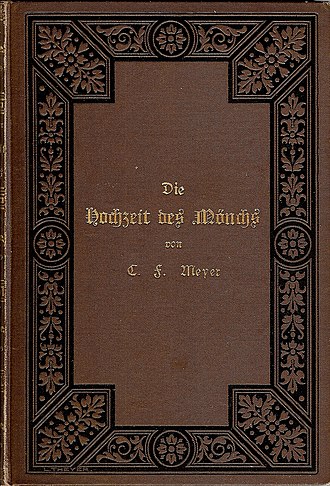The monk's wedding
The Monk's Wedding is a novella written by Conrad Ferdinand Meyer in 1884 .
content
The play is built into a framework story told by the Italian poet and philosopher Dante Alighieri at the royal court in Verona in the Middle Ages . In the circle of the aristocrats, he tells the tragic story of the monk Astorre, which he claims to have taken from a gravestone inscription in a Franciscan monastery in Padua . Dante spontaneously integrates the names of his listeners during his narration and gives the characters of the story different character traits of his listeners so that they feel directly addressed and interrupt him again and again with curiosity. Dante also interrupts himself during his lecture and corrects his story again.
The internal plot tells that the monk Astorre is forced by his dying father to revoke his vow of faith and to promise to marry Diana, the wife of his deceased brother, otherwise the family could no longer exist. Diana falls in love with Astorre, but Astorre does not return her love. At first Astorre struggles with his fate, because he sees himself cheated out of his life goal, but then unexpectedly falls in love with the beautiful Antiope. To the dismay of everyone, he wed her the day after the engagement to Diana. The incident turns into a general scandal and ultimately leads to a three-fold murder: Diana avenges the breach of faithfulness committed against her and murders Antiope. Thereupon Astorre stabs Diana's brother, his childhood friend Germano, and is finally mortally struck by the dying man's sword.
Characters
- Astorre - monk who is getting married
- Ezzelin - the tyrant of Padua
- Diana - the monk's fiancee
- Germano - Diana's brother
- Antiope - daughter of a (crazy) countess and Astorre's wife
- Ascanio - friend of Astorre and nephew of Ezzelin
literature
- Oliver Jahraus: Which stories can you tell dictators ?. In: Ders .: The 101 most important questions. German literature. (= Beck series. Vol. 7037). Beck, Munich 2013, ISBN 978-3-406-64760-4 , pp. 142-144.
